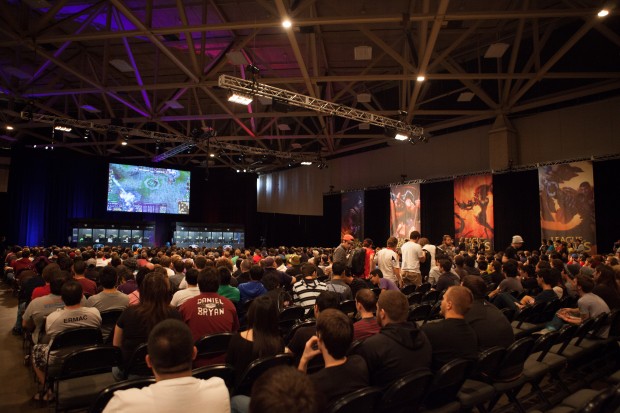Just weeks after announcing its esports division, Activision Blizzard has acquired the assets of live esports event organizer Major League Gaming for an estimated $46 million. The move is part of a larger plan to create the Activision Blizzard esports broadcast network, or the “ESPN of esports.”
The move is a recognition of the growing importance of esports — where gamers become spectators of professional gamers who are competing for increasingly large prize pools in tournaments. Esports could be a $465 million industry by 2017. The esports business has been nascent for a long time, but it has grown rapidly in the past few years and the move by Activision Blizzard, one of the largest Western game publishers, is a stamp of approval.
The deal was first reported on Friday by Esports Observer. Of the amount, $31 million was paid in cash, and $15 million is subject to further conditions. Activision Blizzard did not specifically confirm that amount, which Esports Observer reported.
This buy fits into Activision’s recent moves. Back in October, Activision Blizzard started a new esports media networks division, and it hired former MLG president Mike Sepso as its senior vice president. Sepso is now able to reunite with his former colleagues.
“It was great to be able to walk aback into the office and announce this to the staff,” Sepso said in an interview. “We are really at an interesting inflection point for esports as a mainstream activity. Having the combined resources of Activision Blizzard and MLG is a tremendous opportunity for us to move the whole industry forward.”
Steve Bornstein, the former CEO of ESPN, is chairman of that new division at Activision Blizzard. It’s increased the prize pools for 2016’s championships for two of its main esports games, the online strategy game Heroes of the Storm and the card-battler Hearthstone: Heroes of Warcraft. Rival Electronic Arts also set up an esports division and put former chief operating officer Peter Moore in charge of it.
Bobby Kotick, CEO of Activision Blizzard, said in a statement, “Our acquisition of Major League Gaming’s business furthers our plans to create the ESPN of esports. MLG’s ability to create premium content, its proven broadcast technology platform – including its live streaming capabilities – strengthens our strategic position in competitive gaming. MLG has an incredibly strong and seasoned team and a thriving community. Together, we will create new ways to celebrate players and their unique skills, dedication and commitment to gaming. We are excited to add Sundance and the entire MLG esports team to our competitive gaming initiatives.”
The announcement leaked on Friday, and the companies confirmed that it was happening today. The eSports Observer reported that MLG’s chief executive, Sundance DiGiovanni, had stepped down from his post and was replaced by Greg Chisholm, former chief financial officer of MLG. But DiGiovanni said in an interview with GamesBeat that he and the entire MLG esports team will join Activision Blizzard.
New York-based MLG was founded by DiGiovanni and Sepso in 2002. It holds official video game tournaments throughout the U.S. and Canada, and it broadcasts them on both television and the Internet. Its aim is to elevate video games to become competitive spectator sports. It holds tournaments for games such as Counter-Strike: Global Offensive and Call of Duty.
Activision Blizzard said in a press release that the move will further its “strategic growth plan in competitive gaming” and it will “create new opportunities for players, fans and partners across the global esports community.”
The esports industry has an estimated 100 million viewers already. By 2017, esports is projected to have over 300 million viewers, according to market researcher Newzoo. Activision Blizzard already owns a number of competitive gaming titles, such as Hearthstone, StarCraft, Heroes of the Storm, and Call of Duty.
“There’s so much opportunity, with more resources behind it,” DiGiovanni said. “It’s an incredibly exciting opportunity for me personally with more than a decade of experience in it.”
MLG runs MLG.tv, a premium online broadcast network for professional-level esports, and it operates the MLG Pro Circuit, the longest-running esports league in North America. MLG also operates GameBattles, an online gaming tournament system across console, PC and mobile platforms. MLG will continue to operate MLG.tv, MLG Pro Circuit, and GameBattles.
“We have diversified and made ourselves a more balanced and stronger company,” DiGiovanni said. “If you look at the history of our company, we have had a tremendous amount of success and are proud of what we built. To be able to join a company with the resources of Activision Blizzard is great.”
“The larger underlying trend is that game publishers have started to attract online audiences and are increasingly looking to diversify their efforts across media channels,” said Joost van Dreunen, analyst at market researcher SuperData Research. “In addition, considering the current momentum behind eSports, it is no surprise that the segment is starting to consolidate.”
Earlier in 2015, Swedish broadcasting group MTG acquired a majority share in ESL, MLG’s rival, for $64 million. And Blizzard already acquired the assets of the IGN Pro League back in 2013. Now, with the acquisition of MLG’s assets, Activision is on a path to further vertically integrate its effort behind competitive gaming and bolster its position, van Dreunen said.
“Following several other acquisitions and announcements from Activision, it is clear that the firm is evolving into a media conglomerate rather than a company that simply develops and publishes video games,” van Dreunen said. “This is a consistent trend we have also observed elsewhere in the industry, with firms like Electronic Arts, Ubisoft and Take-Two Interactive, as the potential of ad-based revenue has come into focus.”
SuperData estimated that esports currently generates $748 million in revenues, and it is on track to reach $1.9 billion by 2018.
–
VentureBeat's mission is to be a digital town square for technical decision-makers to gain knowledge about transformative enterprise technology and transact. Learn More

